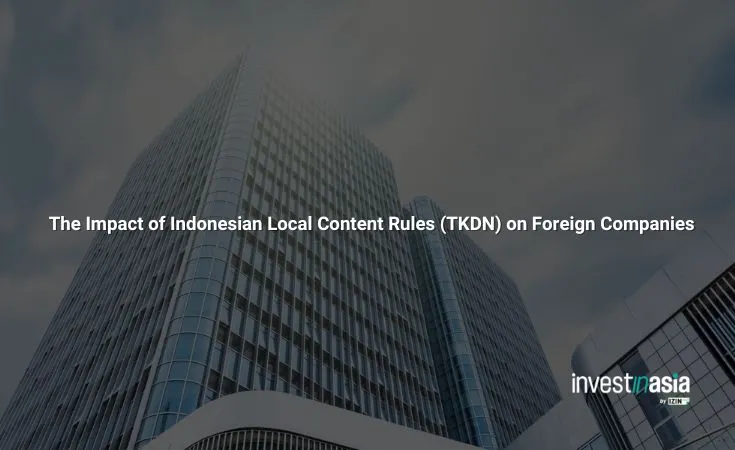Indonesia’s TKDN regime shapes how foreign companies produce, source, and sell in Southeast Asia’s largest economy. In short: if you want market access or to bid on strategic projects, you need to meet domestic content thresholds and prove it through accredited verification.
The rules are rooted in national industrial policy and actively enforced, with headline cases showing the cost of non-compliance.
Also read: The Complete Checklist Before You Open a Business in Indonesia (Local and Foreign)
What TKDN Is and Why It Matters


TKDN regulations, established under Law No. 3 of 2014 on Industry and Government Regulation No. 29 of 2018, mandate specific percentages of domestic content in goods and services across various sectors.
The policy requires foreign and domestic companies to utilize local materials, labor, and services up to specified minimum thresholds, with requirements varying significantly by industry.
How Compliance Is Calculated
Auditors look at bills of materials, payroll shares, and domestic services. They also review logistics, tooling, and subcontracted steps performed locally.
The score blends direct and indirect local contributions. Your documentation must match physical evidence on site.
Sector-Specific Requirements
| Sector | TKDN Requirement (%) | Implementation Status | Key Challenges for Foreign Companies |
| Smartphones/Mobile Phones | 30-40% | Active | Supply chain adaptation, local component sourcing |
| Electric Vehicles (2-3 wheel) | 40% (2019-2023), 60% (2024-2025) | Active | Limited local manufacturing capacity |
| Electric Vehicles (Current) | 40% (Temp. 2024-2026), 60% (2027+) | Temporarily Reduced | Technology transfer requirements |
| Automotive | 70-80% | Active | Extensive local supplier network needed |
| Electronics (General) | 20-40% | Active | Component quality and availability |
| Oil & Gas Equipment | 24-40% | Active | Technical expertise requirements |
| Medical Devices | 60%+ | Active | Regulatory compliance complexity |
| Agricultural Machinery | 43%+ | Active | Local supplier development |
| Power Plants | 30-70% | Active | Infrastructure and technology transfer |
| Telecommunications (4G LTE) | 30% | Active | Investment in local facilities |
| Pharmaceutical Products | Various | Active | Active ingredient sourcing |
Major Impacts on Foreign Companies
Market Access and Compliance Challenges
Foreign companies face substantial barriers when failing to meet TKDN requirements. The most prominent recent case involved Apple, whose iPhone 16 was banned from Indonesian markets for five months (October 2024 to March 2025) due to non-compliance.
This resulted in Apple committing to a $300 million investment package to regain market access, demonstrating the policy’s significant leverage over multinational corporations.
Investment and Restructuring Requirements
TKDN compliance often necessitates substantial capital investments and supply chain modifications. Unlike rivals such as Samsung, OPPO, and Xiaomi that invested in local manufacturing plants, Apple first pursued an innovation-focused route by setting up Developer Academies.
However, regulatory pressure ultimately forced a shift toward manufacturing investments, including a planned AirTag facility in Batam and expanded R&D operations.
Foreign investment companies (PMA) face additional restrictions, being prohibited from selling directly to retailers or consumers and must appoint 100% Indonesian-owned distributors (PMDN).
This creates complex distribution structures that add operational costs and compliance requirements.
Administrative and Verification Burden
The TKDN certification process involves extensive documentation, regular audits by government-appointed surveyors, and periodic renewals every three years.
Companies must undergo verification processes that assess production documentation, invoices, contracts, and physical evidence of domestic content compliance.
Sanctions for non-compliance range from written warnings to business license revocation. Recent enforcement has become more stringent, with authorities taking varied approaches while maintaining high compliance expectations.
Also read: Top Questions Foreigners Ask Before Registering a Business in Indonesia
Key Impact Areas
| Impact Category | Description | Example/Case Study |
| Compliance Costs | Additional costs for verification, certification, and compliance processes | Apple faced $15M shortfall in investment commitments (2020-2023) |
| Supply Chain Restructuring | Need to establish local supplier networks and modify global supply chains | Samsung, OPPO, Xiaomi established local production facilities |
| Investment Requirements | Mandatory investments in local manufacturing, R&D, or innovation centers | Apple committed $300M+ investment for iPhone 16 market access |
| Market Access Restrictions | Products banned if TKDN requirements not met (e.g., iPhone 16 case) | iPhone 16 sales banned in Indonesia for 5 months (Oct 2024-Mar 2025) |
| Administrative Burden | Complex documentation, audits, and certification processes | TKDN certificates valid for 3 years, require regular renewal |
| Technology Transfer | Requirements for knowledge sharing and local capacity building | Apple Developer Academies as innovation compliance method |
| Employment Creation | Positive impact through job creation in domestic industries | Manufacturing sector contribution increased to 17.5% of GDP |
| Local Partnership Requirements | Mandatory collaboration with local Indonesian companies | Foreign companies must work with 100% Indonesian-owned distributors |
When Non-Compliance Bites
Sanctions range from warnings to license issues and sales stoppages. High-profile cases show regulators will enforce the rules.
Even global brands have had to adjust. Stronger enforcement has pushed more manufacturing and innovation onshore.
Also read: Common Mistakes Businesses Must Avoid When Starting a Company in Indonesia
Administrative Load You Should Expect
Certification requires accredited surveyors, multi-folder documentation, and periodic renewals. Internal audit readiness is essential.
Plan for recurring site visits, transaction sampling, and evidence trails. Treat it like a continuing compliance program, not a one-off.
Economic Upsides and System-Level Frictions


The policy has lifted domestic value-added and supplier participation. It supports technology transfer and skilled jobs.
But aggregate gains can be uneven. Input costs and supplier readiness vary by sector and region.
The Reform Signal Under President Prabowo
Since April 2025, President Prabowo has publicly pushed to make TKDN “flexible” and “realistic,” hinting at incentive-led approaches where mandatory thresholds might be impractical. Business groups welcome clarity but warn against swings that could disadvantage domestic suppliers.
Pragmatically, foreign firms should plan for compliance, while tracking carve-outs or incentive paths in strategic sectors.
Also read: What Happens If You Operate a Business in Indonesia Without a Proper License?
Practical Playbook for Foreign Entrants
- Gap analysis first: Map current BOMs and labor ratios to target TKDN thresholds; quantify the delta and prioritize high-impact components.
- Localize strategically: Onshore sub-assemblies with favorable weight in the TKDN formula; pair with supplier development for quality ramp-up.
- Design for verification: Build traceability from PO to production. Your surveyor will test the paper trail.
- Use sectoral flexibilities: Track exemptions/adjustments in energy and ICT where domestic capability is still maturing.
- Structure the channel: Define your PMA’s scope in coordination with a registered Indonesian distributor or agent and formalize the partnership as early as possible.
What “Good” Looks Like
- You hit the sector floor with margin to spare. Your supplier base is dual-sourced with local depth.
- Your certification cycle is predictable. Internal KPIs track TKDN exposure at product and SKU level.
- You are tender-eligible and license-secure. Your teams can explain the score, line by line.
- You want market access with fewer surprises. You also want incorporation, sectoral licensing, and TKDN pathways aligned from day one.
If you’re ready to enter Indonesia or regularize compliance, InvestinAsia provides end-to-end support for company registration in Indonesia, ensuring compliance, efficiency, and an optimal distribution model structure.
Our expertise helps foreign investors maximize benefits while reducing bureaucratic risks.
We also provide other services such as:
- PMA registration in Indonesia (Foreign Company)
- Representative office registration in Indonesia
- Indonesia Local PT PMDN Set Up
- Indonesian Virtual office setup
- Business registration number in Indonesia
- Business Licenses in Indonesia
- Trademark Registration in Indonesia
- Franchise License in Indonesia
If you are interested in starting a business in Indonesia without hassle, you can start by contacting us for FREE consultation.
You get one project plan that covers entity setup, licensing, documentation prep, and submission timing—so you can focus on engineering and supplier localization.
Ready to enter Indonesia with TKDN-aware structuring?
Start your company registration with InvestinAsia’s experts today!
FAQs
What is TKDN in simple terms?
It is Indonesia’s local content score that blends domestic materials, labor, and other costs into a percentage.
How long does certification last?
Typically three years, with audits and renewals required.
Can software or R&D count toward TKDN?
Yes, certain innovation and application development activities can contribute under recognized methodologies.
Do all sectors have the same threshold?
No. Thresholds are sector-specific, and calculation rules can differ.
Can a PMA sell directly to retailers?
Often no. Many PMA companies must use 100% Indonesian-owned distributors, depending on the sector and licensing.
What if local inputs are not available yet?
Recent signals suggest more flexible or incentive-based approaches and possible exemptions in capability-gap areas.
References
ERIA. Indonesia’s Local Content Requirements: Assessment with WTO Rules. https://www.eria.org/uploads/media/discussion-papers/FY21/Indonesias-Local-Content-Requirement-WTO-Rules.pdf.
ERIA. Quantifying the Impacts of Local Content Requirements: An Analysis on Indonesia. https://www.eria.org/uploads/media/Ch8_Ing_and_Zhang_LCR_230503_1.pdf.
Business Indonesia. TKDN Regulation. https://business-indonesia.org/tkdn_regulation.



